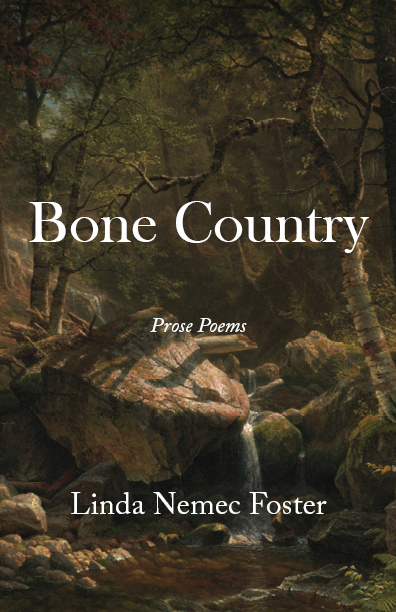In Bone Country (110 pages; Cornerstone Press), the thirteenth poetry collection by Linda Nemec Foster, each poem is a snapshot, presented in a fragmented style that emphasizes the intensity of each image. Despite this fragmentation, the collection is united by a quick rhythm that propels the reader.
Every piece is imbued with an intense sense of place in Europe. Warsaw, Krakow, Bratislava, the Tatra Mountains, Now Sac, Rzeszow, Tarnow, and the Baltic Sea all make early appearances. Poland is the central focus, from the beauty of natural landscapes to the horrors of war and occupation. The collection explores the tension between the natural world and human history, and the impact that these forces have on both individual lives and broader cultural narratives. This effect culminates in “November Night, Warsaw, 1944,” which is filled with the dark mid-century imagery that are conjured in its title: Nazi occupation, the Warsaw ghetto, and the war machine. Against this backdrop, the poem’s focus is on one tree that has survived. It concludes:
And on the tree, one solitary leaf—glistening with rain? with tears?—bribes the witness to testify. To the beginning, to the end, to the limited possibilities of a muted, endless winter.
The tree stands as a symbol of the continuity of life in the face of death and ruin. The “limited possibilities of a muted, endless winter” suggests a despair that extends beyond the immediate aftermath of the bloodshed. The winter is “endless,” indicating that the suffering and destruction will continue indefinitely, while the term “muted” implies a numbness or lack of voice. In this context, the tree’s solitary leaf takes on a new significance. It is a reminder of the narrow possibilities that exist in the face of such overwhelming adversity. The leaf’s glistening surface, which may be wet with rain or tears, highlights the emotional weight of the witness’s testimony and the sense of loss that accompanies it.
The image of the witness being called on to testify is a reminder of the importance of remembering the past and acknowledging the ongoing impact of war and occupation. It is a call to bear witness to the mayhem and misery that continue to shape our world, and to find hope and resilience in the face of seemingly insurmountable challenges.
Occupation itself is another through-line in Bone Country, which pays attention to the myriad ways in which people—men, primarily—become occupied by outside forces. (One humorous example of this is in “Pornography at the Charles de Gaulle Airport, Paris,” when a man becomes so distracted that he doesn’t notice a naked woman in front of him, but is instead taking a picture of a boat.) A more poignant example can be found in the poem “Conjuring Her Face,” in which an artist tells a woman that he’s seen her before in town, even though she’s never been there. He’s so persistent that she begins to believe him. Not only is the artist painting this stranger with the obsession of a master toward his muse; he’s actively occupying the woman himself by taking possession of her thoughts, controlling her from within. And what is occupation, but control? Even as he puts this woman on a pedestal, marveling at her beauty, he disregards the complexity of her life. The idea of a woman supersedes reality.
It’s finally in “Where Do Famous Dead Writers Go?” that the objectification and hostile occupation of women becomes personal to the speaker of the poem, after she runs into a famous poet who had given her the sexist label poetess when they met:
He didn’t recognize the poetess, but he did recognize my cleavage.
Desire, degradation, and deification all compete against the reality of a woman on the page, and this poetry collection is self-aware enough to argue that the representation of a woman—or of Poland as a motherland, for that matter—is driven by oversimplification. Bone Country is not just a place, bearing the scars of long-ago occupation, but a body refusing to be claimed as a possession.

